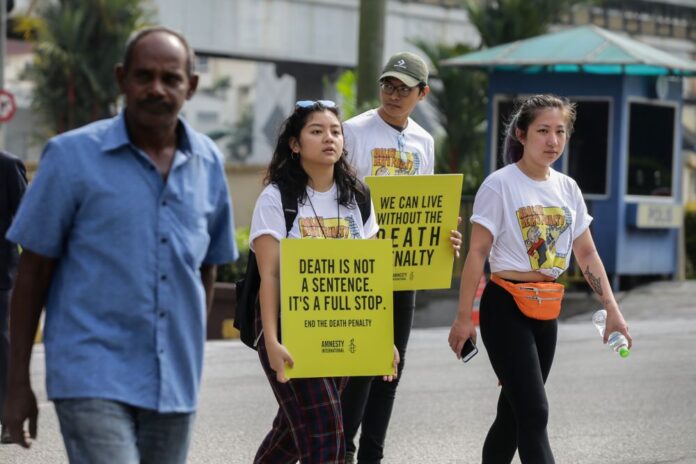Members of Amnesty International Malaysia protest against the death penalty at the Singapore High Commission in Kuala Lumpur July 25, 2019. — Picture by Ahmad Zamzahuri
KUALA LUMPUR, Nov 28 — Fewer individuals in the country have been handed the death sentence over the past four years, with the decline first noted starting 2018.
Citing data from the offices of the Registrar of the High Court of Malaya and Registrar of the High Court of Sabah and Sarawak, The Sunday Star reported today a total of 478 people were sentenced to hang from 2018 to date.
The newspaper reported that in 2018, a total of 172 convicts were sentenced to death and the number slid further to 118 people in 2019, dipping to 112 in 2020, and just 76 people this year to date.
Malaysians made up 372 or 77.8 per cent of the 478 total to get the death sentence, with the remaining 106 or 22.2 per cent non-citizens.
In the peninsula, drug trafficking topped the list of crimes punishable by death at 67 per cent, followed by murder at 30 per cent, illegal possession of firearms at 2 per cent and kidnapping at 1 per cent.
In Sabah, 70 per cent of capital punishment meted out was for drug trafficking followed by murder at 30 per cent.
The death penalty has been in the limelight recently due to the case of Malaysian Nagaenthran K. Darmalingam, who was convicted of smuggling 42.72g of heroin into Singapore back in 2009.
Subsequent to Nagaenthran’s conviction, calls for abolishment to capital punishment have further reignited with some urging against the execution through plea for clemency on humanitarian grounds.
Malaysians Against Death Penalty and Torture spokesman Charles Hector said death penalty should not be imposed if it did not directly result in the death of anyone and argued that a person convicted of trafficking lesser amount should receive a lesser punishment than those convicted of trafficking more.
“The death penalty is also not in the best interest of any children of the convicted,” he said.
Amnesty International Malaysia also voiced its opposition against capital punishment in all cases as it is a violation of the right to life, further calling on the government to continue observing the moratorium on all executions until the death penalty is fully abolished.
“With the case of Nagaenthran, the public can see just how brutal the death penalty system is.
“Despite having an intellectual disability, the Singapore government is insistent on executing him.
“Family members who visited him recently have described how his mental health has deteriorated to the point of doubting whether he understands that he is close to being executed.
“This is why even as we try to halt Nagaenthran’s execution in Singapore, we urge the Malaysian government to continue efforts to fully repeal the death penalty here,” it said.
However, some Malaysians believe that the death penalty should not be abolished wholesale and retained for certain crimes like murder and repeated corruption.
“For drug-related offences, I may agree to do away with the death sentence but I still support the death sentence for murder.
“I would also agree if there is a suggestion to impose capital punishment for continuous corruption,” Malaysian Syariah Lawyers Association deputy president Moeis Basri told The Sunday Star.
Former inspector-general of police Tan Sri Khalid Abu Bakar is another advocate of capital punishment.
Unlike Moeis, the former top policeman believes the death penalty should be maintained for drug trafficking to keep it under control.
“With the capital punishment, we will be able to prevent Malaysia ending up in situations like in Latin American countries, where drug cartels are in control,” he said.
However, he agreed that instead of making it a mandatory punishment, judges should be given discretionary powers to offer life imprisonment.


